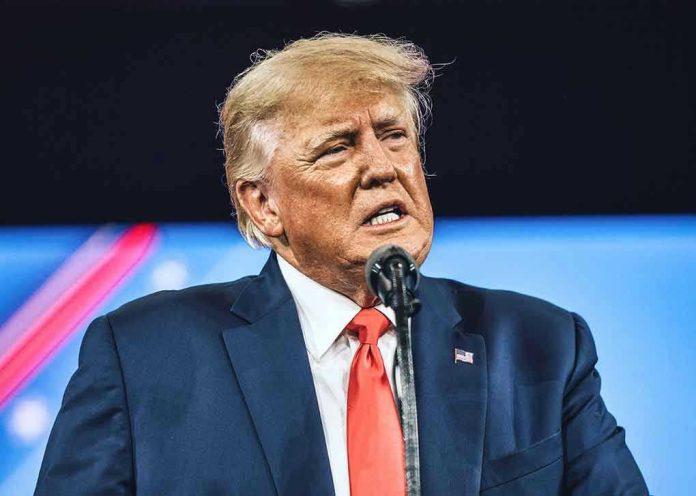
One explosive Oval Office moment can redraw the battle lines of American politics—and when Trump targets two progressive congresswomen with insults as raw as they are revealing, the fallout goes far beyond the headlines.
Story Highlights
- Trump’s public insults of Reps. Jasmine Crockett and Ilhan Omar reignite debates over race, gender, and political discourse.
- Personal and nationally charged remarks made during an official White House event spark immediate condemnation and renewed partisan tensions.
- The episode spotlights the persistent targeting of women of color in Congress and the shifting boundaries of political rhetoric.
- Public and political responses reveal deepening divides, shaping the narrative ahead of the 2026 midterms.
Trump’s Oval Office Outburst Sets a New Political Flashpoint
During an executive order signing, Donald Trump, never one to mince words, labeled Rep. Jasmine Crockett “a very low IQ person” and turned to Rep. Ilhan Omar with a quip that Somalia should “take her back.” The room was thick with administration officials and reporters, ensuring that every barb would reverberate far beyond the West Wing. This was no stray comment; it was a calculated jab at two of the most visible progressive women of color in Congress, delivered at a moment when the nation’s political nerves were already raw. How did we get here, and why do these words still matter?
Trump’s remarks landed just weeks after the assassination of conservative activist Charlie Kirk, an event that had already sent shockwaves through Washington. In the days following Kirk’s death, Rep. Omar’s critical statements about his legacy and the public’s reaction drew fire from the right. Meanwhile, Crockett’s comparison of ICE to slave patrols became fresh fodder for conservative outrage. Trump’s decision to attack both lawmakers in one breath was more than opportunism—it was a signal to his supporters and adversaries alike that the culture war remains his chosen battleground.
Women of Color in the Political Crosshairs
Rep. Jasmine Crockett, a former public defender from Texas, and Rep. Ilhan Omar, a Somali-born, Minnesota-based progressive, stand as two of the most scrutinized figures in Congress. Crockett’s advocacy on civil rights and voting rights has made her a lightning rod for Republican criticism, while Omar’s immigrant background and unapologetic defense of marginalized communities have made her one of Trump’s favorite targets. This isn’t their first time in the crosshairs. Trump’s 2019 “go back” tweets against the so-called Squad set a precedent for this latest round of attacks.
What makes this episode different is the convergence of personal insult and racially loaded rhetoric—broadcast live, on the record, and with the imprimatur of the Oval Office. Crockett and Omar, backed by the Congressional Black Caucus and progressive allies, immediately denounced the comments as racist and sexist. Trump, for his part, doubled down, framing the two lawmakers as avatars of a “radical left” threatening American values.
Ripple Effects: Media, Power, and the American Divide
The immediate aftermath saw media outlets and advocacy groups rushing to stake their ground. Conservative media amplified Trump’s framing, painting his remarks as plain-spoken truth. Progressive voices, meanwhile, highlighted the dangers of normalizing attacks on women of color in public life. If anything, this episode has only deepened the rift in how Americans interpret political speech—what one side calls candor, the other calls bigotry.
Trump’s ability to command the spotlight—and to force his critics to respond on his terms—remains unmatched. His relationship with the Republican base, and with conservative influencers eager to echo his rhetoric, ensures that these moments are not only news but also fuel for ongoing culture wars. At the same time, the resilience of lawmakers like Crockett and Omar, who refuse to let such attacks go unanswered, signals a changing dynamic: the targets are fighting back, reshaping the narrative in real time.
The Stakes for Democracy and Political Discourse
As the dust settles, the broader implications come into focus. Trump’s comments are not isolated—they’re part of a pattern that has eroded the norms of civility in political life, particularly for women and minorities. The spectacle of public insult from the nation’s highest officeholder raises hard questions about the future of political discourse. Will voters tire of the theatrics, or has the era of the combative, anti-establishment leader become the new normal?
For Crockett, Omar, and the communities they represent, the stakes are tangible. These attacks do more than score political points—they shape perceptions, inflame divisions, and, for many, reinforce the sense that American democracy remains a battleground over who belongs and who gets to speak. As 2026 looms, one thing is certain: the fight for the soul of American politics is far from over, and every word counts.



